Marstrand, Part 6 “They Eat Children.”
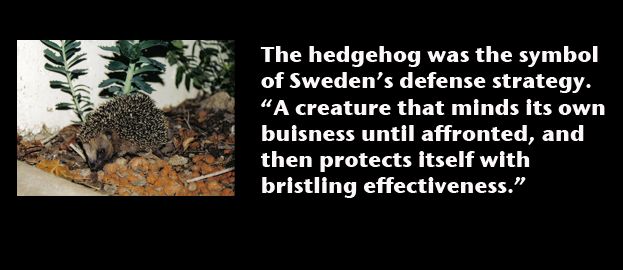
Greta remembered “Everyone held their breath because there was much talk of war. The Swedish people were given instructions for many different situations.” There were steep increases in sales taxes and income taxes. Duties were levied on imported goods. All to pay for stronger defenses. Swedes actually gave more from their pocket than its government asked through various charitable groups.
Germany wielded influence over Sweden through various threats and reprisals. Gunhild mentioned how Sweden needed medicine and vaccine for an out break of Hoof and Mouth Disease (Anthrax). Their request to Germany was answered with a resounding “NO!” Hitler reiterated a familiar and phony claim he used when taking Czechoslovakia. He said northern Sweden, and the iron ore mines, were “old German territory.”
Those Machiavellian tactics also affected life in Marstrand. By 9 P.M. the streets were empty. Almost everyone was inside. “The Germans like all of Marstrand to be ‘tucked in’ for the night,” said Gunhild.
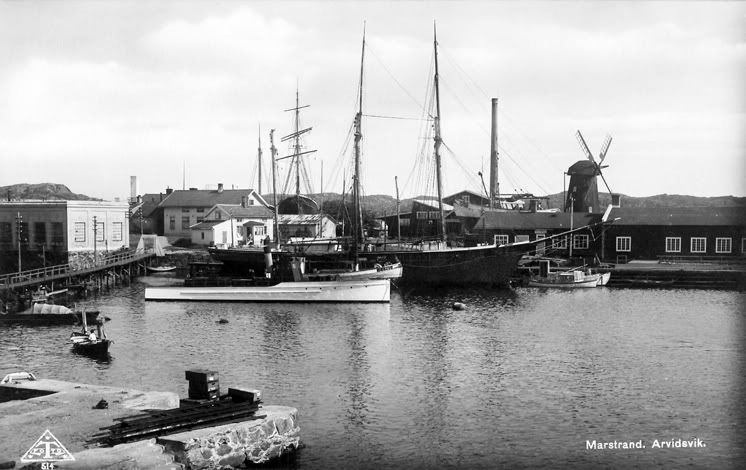
Children knew an element of fright at this time as well. They were told they must stay away from the German soldiers because “They eat children.”
“One dusk evening my mother was working at the hospital as a volunteer nurse. Grandfather was supposed to watch me, but I left the house and went ‘exploring’ down by the wharf. I saw a couple of ships anchored there, each having the big black German cross on the side. I hid in the bushes to watch. I wanted to see what kind of people ‘ate children.’ I hadn’t seen a German up close before. I watched as they loaded the boats. ‘Why, they look like regular people,’ I said to myself. Suddenly, right beside me I saw a pair of shiny black boots. I looked up slowly and gasped. It was a German officer!! ‘Oh, he’s going to eat me,’ I thought. My heart was pounding wildly. If I could only disappear into the air or something.
“The German officer was very tall and blond with the most startling blue eyes I had ever seen. They were kind eyes; they were smiling too. He leaned over and patted me on the head. Gently he said in Swedish, ‘run along home, little girl. You shouldn’t be out here so late.’ I bolted up and took off running as fast as my legs could carry me, never looking back, till I reached the house.”
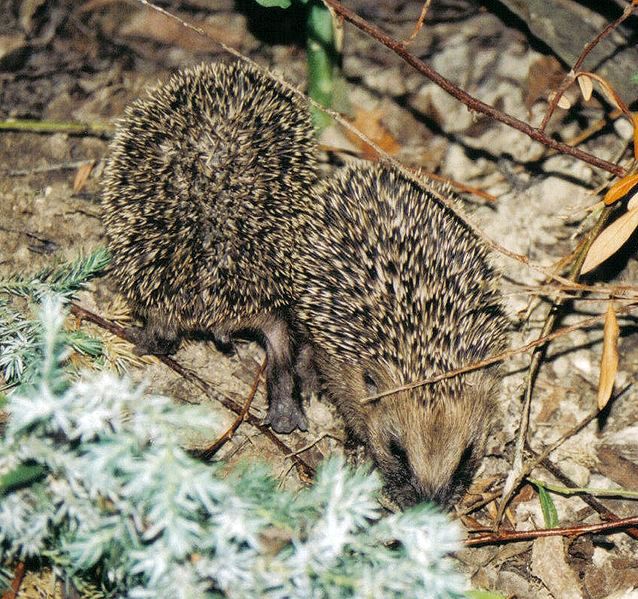
Photo courtesy of Creative Commons,VeraBuhl
The porcupines (They’re actually hedgehogs in Sweden) that Greta knew came near the house to drink milk left out in shallow platters.
“They let me carefully touch them. I’d never seen a real porcupine before. I was much intrigued by the quills and HAD to touch them.” When the last porcupine disappeared to hibernate, winter seemed official.
“The trees lost their leaves and looked like hungry skeletons reaching for the sky.”
The sun wasn’t visible for days. A biting wind swept off the North Sea without break. “When you breathed it felt like tiny icicles piercing your lungs,” said Greta.
Gunhild wrote to Keith and Bill steadily. Not only to bridge the long distance of separation. But she needed funds for cold weather clothing. Perhaps she had not anticipated their stay lasting into winter. Undoubtedly all measure and calculation of this was related to Alma’s condition. By winter She was only able to make coffee visits. Otherwise she rested as Gunhild took over all household work. Yet perhaps she seemed stable enough for Gunhild to suggest Keith might visit next summer. Better summer than winter because of the cold sharp wind that “seems to blow right through you.”
Greta noted “They make a big fuss over Christmas. Everyone prepares for it.” August and Alma had standing annual invitations to an extremely fancy celebration at City Hotel. Only long term full time residents were invited. Not the seasonal residents or visitors. No invitation for Gunhild and Greta.
Gunhild planned a home menu of ham, head cheese and sausages–among other things. She teamed up with a neighbor to produce dozens of “rich, fattening, flavorful sausages filled with lots of delicious herbs and spices.”
Gunhild said, “Lots of cholesterol! They eat many things here which are not good for you.” The Californians missed all the fruits and vegetables readily available back home.
“Mama made her own head cheese, too. I remember seeing it sitting on the sideboard wrapped in a white cloth and squeezed down in place with an old fashioned flat iron.”
Alma complained of feeling ill all the night of December 16. A Doctor came. Her nausea and diarrhea was from stomach cancer. Her condition was eminently grave.
A continuous lengthy drift of snow, the season’s first, came to Marstrand on Monday December 19th, 1938. It was with the appearance of this wintry white blanket Alma Katarina Palm passed from earth.
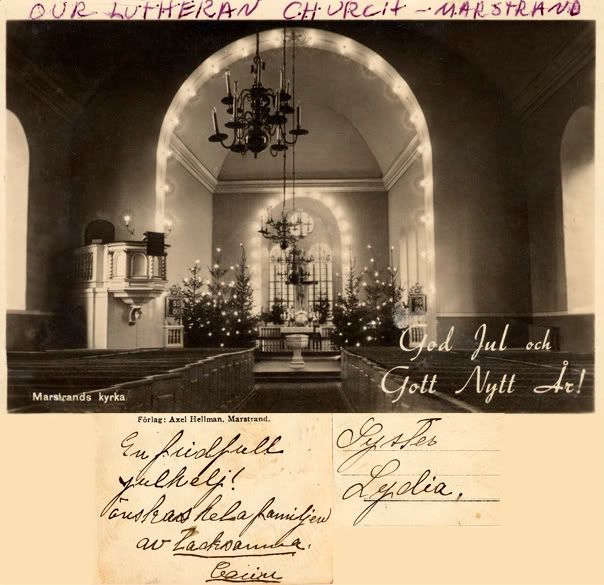
Her funeral was at Marstrand Lutheran Church.
The church service was set against a backdrop of flowers and six large Christmas trees decked with lights. “Everyone said the funeral was beautiful. I thought so too–as far as funerals go,” Said Greta.

August Palm, the day of Alma’s funeral.
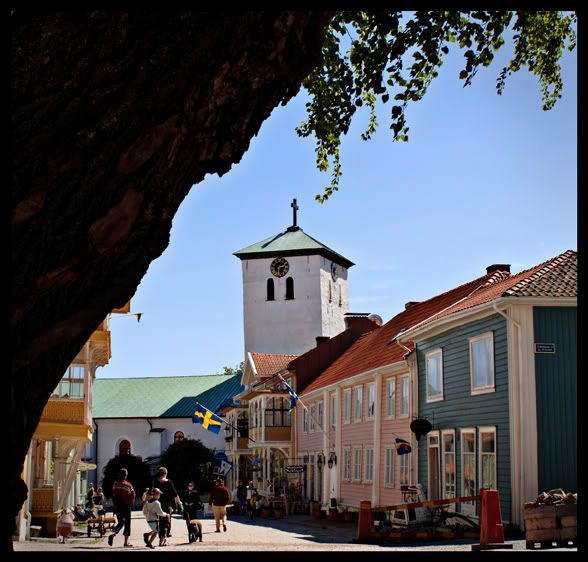
The old poplar tree in the middle of Marstrand’s concourse was witness to that snowy day in December of 1938 when family and friends gathered at Marstrand Lutheran Church (center, with clock tower).
A cafe, Bergs Konditori, was contracted for the gathering after the funeral. Pastries and coffee were served. The cafe was decorated for the occasion.
Gunhild’s sister Margit seated left. Margit, in from Stockholm, stayed up all night with Gunhild at Bergs Konditori to catch up on fifteen years of being apart. Plans eventually emerged for Gunhild and Greta to visit Margit in Stockholm.

Present site of Berg’s Konditori. It wasn’t at this location in 1938, but this store front then contained Greta’s favorite pastry shop where the doll party miniature pastries were given to her.
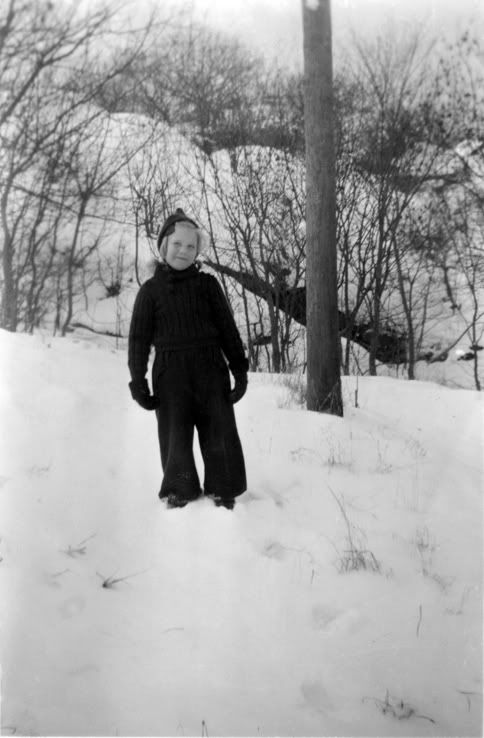
“Christmas came and went quietly. After Christmas I received my first pair of ski pants. I had never seen snow before. I noticed one day how it settled clean, white, and sparkling on a metal rail.” Greta touched this delicate sight with her tongue and suffered instant frozen fusion with the metal. No give or release to all her effort to extract herself. Her attempts to scream and cry for help amounted to no more than garbled tongue-numb utterances heard by no one. Fear, panic, desperation were focused into one “do or die, now or never” YANK.
“Blood was running down my chin and I realized I left a portion of my tongue on that treacherous rail.”
Next: Adventures on Ice.
Note: I moved most of the historical discussion to the comments section as a side bar. If you desire more of the political history.
1 COMMENT
The earlier draft had more “history lesson.” But history can be boring to some, so I decided to include it in a side bar rather than in the main story. Here it is if you want a little more.
All of Scandinavia closely watched the political events of September, 1938, amongst the heads of Germany, Czechoslovakia, Britain and France. For more than a year Hitler waged a propaganda war, making trumped up charges that Germans residing in the Sudetenland region of Czechoslovakia were being abused. The reality was Hitler wanted Czechoslovakia for his own to settle old scores from World War I. And to gain natural resources. He made a bogus claim about it being “old German territory.” He set a deadline of October 1st for German annexation, “Or Else!”
There was high anxiety amongst Hitler’s generals. They could take Czechoslovakia. But it wouldn’t be a cake walk like Austria had been. Furthermore, Germany didn’t have the military resources then to deal with another problem. France was under obligation by treaty to fight in Czechoslovakia’s defense. And Britain would be right behind France. It was impossible to protect the western border of Germany and fight Czechoslovakia simultaneously. Even King Gustav of Sweden implored Hitler to back down to avoid war. “Germany would be solely to blame for it and moreover would inevitably lose it in view of the present combination of the powers.”
But Hitler wasn’t listening to any of this. He had in his mind an unmovable belief, if not faith, that the leaders of France and Britain had no stomach for war so soon after World War I. He especially felt he could manipulate Neville Chamberlain. Hitler was surprised and amazed with the ease and success of his tactics. If Britain wouldn’t get involved, then France wouldn’t either, he calculated. The Fuhrer staged a daring game of brinkmanship and won. And history recorded this moment as “Appeasement at Munich.” The nation of Czechoslovakia was abandoned by it allies for a very brief “peace in our time.”
In 1936 Sweden reacted to Germany’s rearmament by increasing its own military training. Hitler’s taking of Austria and Czechoslovakia was acutely noted by Sweden. While strongly proclaiming herself neutral, Sweden vigorously bolstered defenses. Of all the Scandinavian countries Sweden was the most proactive and best prepared to defend her neutrality. But Hitler had his own interpretation of what neutral meant. To him it was a flimsy legal term. The only real neutrality is one that favored Germany. One “spin” he promoted was that A Third Reich occupation was simply the military protection of a country’s neutrality.
Before war ever broke out, Germany planned to incorporate Denmark, Norway and Sweden. “If they don’t like it,” Hitler proclaimed, “they can drive me out.”
Germany’s interest in Sweden was vital. Their very existence depended upon the high grade iron ore mined from northern Sweden. This material built Hitler’s war machine. If Sweden didn’t do business with Germany and placate Hitler, they faced consequences. It was an arrangement of mutual necessity. In the case of Germany, convenience. There was no use expending military resources on a country already yielding most of what Germany needed. If Hitler was displeased he simply rattled his saber. His reprisals and retaliations were effective.